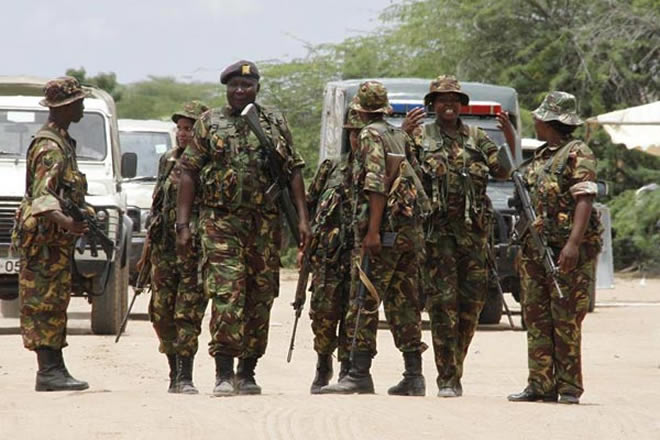
Some of military officers at their camp in Garissa County on April 4, 2015. They took part in the rescue of Garissa University College students after Al-Shabaab militants attacked the institution. FILE PHOTO | JEFF ANGOTE NATION MEDIA GROUP

Tuesday, May 26, 2015
Has Kenya’s terrorism nightmare offered Western countries an opportunity to ‘right’ the weaknesses in the relations with the country?
Some diplomats say that the rise in attacks by Al-Shabaab have provided an avenue to improve their countries’ ties with Kenya.
“There is a genuine concern against terrorism, and this is a global phenomenon which everyone wants to help stop. But there is an element of relations which had taken a lull initially,” a defence attaché at a European embassy in Nairobi told the Nation.
“The idea of offering support also means that relations will improve. It is a case of killing two birds with one stone really,” the diplomat added.
Officially, both the government and the embassies deny that there had been any ‘cooling’ of relations.
British High Commissioner Christian Turner told the Nation that Kenya was free to choose friends in every field of engagement.
“I don’t accept this notion of competition between partner nations in Kenya. This is a multi-polar world where all countries benefit from a rise in foreign investment. We are all interlinked,” he argued in an interview early this month.
“There is no binary choice for Kenya to make between the US and UK, nor for that matter between East and West. Kenya should make investment decisions based on what is most in Kenya’s interests,” Dr Turner added when asked on the status of Kenya-UK relations.
ICC CASES
But events preceding the 2013 elections and those that followed indicate the turn-point may have been influenced by helplessness on fighting terror.
The US, and other European allies initially expressed reluctance to associate with an ICC-indicted president and so they hinted on ‘essential contacts.’
In turn, the government went for business deals in the East, where contracts worth more than Sh500 billion were signed. They include the construction of the standard-gauge railway and several other projects in energy, and infrastructure.
Yet this was also a time when terror strikes increased. Between the time Mr Kenyatta came to office on April 09, 2013 and end of December 2013, there had been 102 terror attacks on Kenyan soil.
The worst of these were at Westgate (67) and Garissa University College (148 deaths).
These attacks were deplorable and needed an urgent response, but diplomats argue they also provided a catch-22 situation on whether to pursue a luke-warm arrangement with the West.
“It does give an interesting dilemma to President Kenyatta as to how he wants to conduct his counter-terrorism campaign. I do not think it is a given fact that Kenya will - or should - go the “western” route in counter-terrorism,” argued another diplomat in Nairobi who wished not to be named.
But given there had been a long association with countries like the US on war on terror before, the envoy argues, it would not be surprising that the offers against terror are coming from the West.
In the latest programmes, the European Union has joined Western countries such as the US and the UK in a number of counter-terrorism efforts launched just under a year ago to support Kenya’s fight against terror.
These are in addition to the financial boost to the African Union Mission in Somalia (Amisom). Since 2007, Amisom, in which Kenya Defence Forces serve, has received €411 million. Each soldier in the Mission earns $1000 stipend per month.
Early this year, the EU launched a four-year programme to be based in Nairobi where Kenya, Somalia and Ethiopia would be supported to counter radicalism, combating money laundering and fighting arms proliferation. It would cost €26.7 million.
COUNTER-TERRORISM
The US on the other hand offered $100 million to go to border protection and intelligence sharing while the British have offered to train security agencies and equipment support worth Sh8.6 billion a year.
These projects are meant to fight terrorism, but it is also a struggle to balance between war on terror and respect for civil liberties. Two weeks ago, Interior PS Monica Juma explained this at a conference on counter-terrorism.
“If anything, since the country’s civil liberties have expanded as opposed to many democracies that are now bringing them down, it (Kenya) is facing huge challenges in counter-terrorism measures,” Dr Juma told the audience at the University of Nairobi.
“We know that in the recent attacks, whether it has been in Australia, or whether it has been in France and we have seen it also in Canada… there have been a raft of measures that have actually been more restrictive in these countries compared to the amendment laws of 2015.
“You will be quite surprised at how careful and cautious we have been in terms of safeguarding the civil liberties as provided in the Constitution,” Dr Juma said.